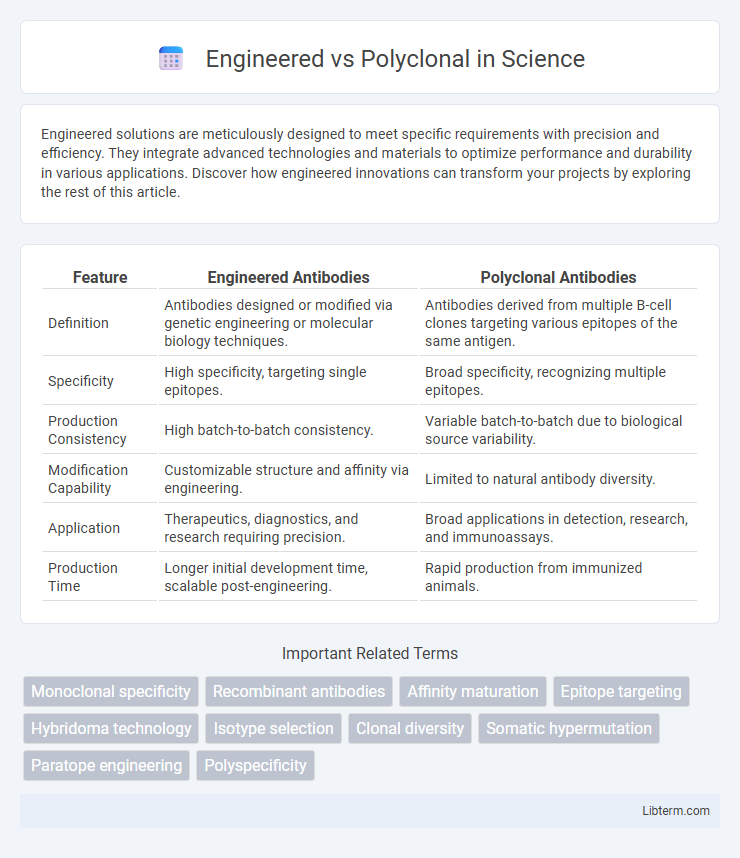Engineered solutions are meticulously designed to meet specific requirements with precision and efficiency. They integrate advanced technologies and materials to optimize performance and durability in various applications. Discover how engineered innovations can transform your projects by exploring the rest of this article.
Table of Comparison
| Feature | Engineered Antibodies | Polyclonal Antibodies |
|---|---|---|
| Definition | Antibodies designed or modified via genetic engineering or molecular biology techniques. | Antibodies derived from multiple B-cell clones targeting various epitopes of the same antigen. |
| Specificity | High specificity, targeting single epitopes. | Broad specificity, recognizing multiple epitopes. |
| Production Consistency | High batch-to-batch consistency. | Variable batch-to-batch due to biological source variability. |
| Modification Capability | Customizable structure and affinity via engineering. | Limited to natural antibody diversity. |
| Application | Therapeutics, diagnostics, and research requiring precision. | Broad applications in detection, research, and immunoassays. |
| Production Time | Longer initial development time, scalable post-engineering. | Rapid production from immunized animals. |
Introduction to Engineered and Polyclonal Antibodies
Engineered antibodies are designed through biotechnological methods to enhance specificity, affinity, and stability, often produced using recombinant DNA technology. Polyclonal antibodies consist of a heterogeneous mix of antibodies produced by different B cell clones in response to an antigen, offering broad epitope recognition. These two antibody types serve distinct roles in research and therapeutic applications due to their structural differences and production methods.
Definition and Key Differences
Engineered antibodies are synthetic molecules designed for specific targets with uniform affinity and consistent production, often created using recombinant DNA technology. Polyclonal antibodies consist of a heterogeneous mixture of immunoglobulins produced by different B cell clones in response to an antigen, providing broader epitope recognition. Key differences include specificity, consistency, and reproducibility, with engineered antibodies offering high precision and batch-to-batch uniformity, while polyclonal antibodies exhibit variable affinity and recognition due to their diverse origins.
Production Methods: Engineered vs Polyclonal
Engineered antibodies are produced using recombinant DNA technology, allowing precise control over antibody specificity and affinity through gene cloning and expression in host cells such as CHO or HEK293. Polyclonal antibodies are generated by immunizing animals like rabbits or goats, resulting in a heterogeneous mixture of antibodies targeting multiple epitopes, harvested from serum or ascites fluid. Engineered antibody production offers batch-to-batch consistency and scalability, while polyclonal production is faster but exhibits variability and limited reproducibility.
Specificity and Target Recognition
Engineered antibodies exhibit enhanced specificity and precise target recognition due to their design, allowing for optimized binding affinity to unique epitopes. Polyclonal antibodies, derived from multiple B-cell clones, recognize multiple epitopes on the same antigen, providing broad target coverage but often with lower specificity. This distinction makes engineered antibodies preferable for applications requiring high precision, such as diagnostic assays and targeted therapies.
Applications in Research and Diagnostics
Engineered antibodies offer precise specificity and reproducibility, making them ideal for targeted applications in research and diagnostics such as biomarker detection and therapeutic monitoring. Polyclonal antibodies, with their ability to recognize multiple epitopes, provide robust sensitivity, beneficial in assays where detecting diverse antigen variants or capturing low-abundance proteins is critical. Both types are foundational in ELISA, Western blotting, and immunohistochemistry, with engineered antibodies preferred for high-throughput screening and polyclonals favored for initial antigen discovery.
Therapeutic Uses: Comparing Effectiveness
Engineered antibodies, such as monoclonal antibodies, offer high specificity and consistency in targeting disease markers, making them highly effective for cancer immunotherapy and autoimmune disorder treatments. Polyclonal antibodies provide a broader immune response by recognizing multiple epitopes, enhancing their effectiveness in infectious disease management and diagnostic applications. Comparative studies show engineered antibodies excel in precision and reduced side effects, while polyclonal antibodies exhibit superior versatility and rapid response in diverse therapeutic scenarios.
Scalability and Cost Considerations
Engineered antibodies offer high scalability due to standardized production methods and batch consistency, which reduces variability and lowers long-term manufacturing costs. Polyclonal antibodies, while less expensive upfront, face scalability challenges because they rely on animal immune responses, leading to batch-to-batch variability and increased costs in large-scale production. Strategic selection between engineered and polyclonal antibodies depends on balancing initial cost constraints with the need for consistent, scalable outputs in biotechnological applications.
Stability and Consistency in Results
Engineered antibodies exhibit superior stability due to their defined amino acid sequences and controlled production processes, resulting in consistent performance across experiments. Polyclonal antibodies, derived from multiple B-cell clones, often show batch-to-batch variability and reduced reproducibility because of their heterogeneous nature. The enhanced consistency of engineered antibodies makes them preferable for applications requiring precise quantification and reliable long-term storage.
Advantages and Limitations of Each Type
Engineered antibodies offer high specificity and consistent performance by targeting precise epitopes, enabling reproducible results in diagnostic and therapeutic applications. Polyclonal antibodies provide a broader immune response due to their recognition of multiple epitopes, increasing sensitivity but compromising specificity and batch-to-batch consistency. Engineered antibodies face limitations in time and cost of development, while polyclonal antibodies present variability and limited supply due to their biological source.
Future Perspectives in Antibody Development
Engineered antibodies, designed for enhanced specificity and affinity, are driving innovation in targeted therapies and precision medicine. Polyclonal antibodies, with their ability to recognize multiple epitopes, remain valuable for diagnostic versatility and immune response studies. Future perspectives reveal a convergence where engineered polyclonal platforms may combine high specificity with broad epitope recognition, optimizing therapeutic efficacy and reducing resistance mechanisms.
Engineered Infographic

 libterm.com
libterm.com